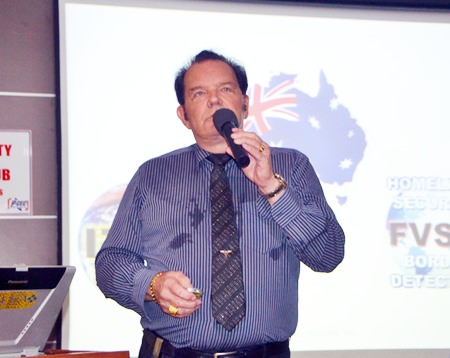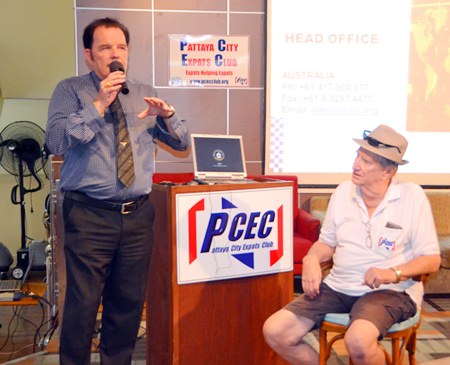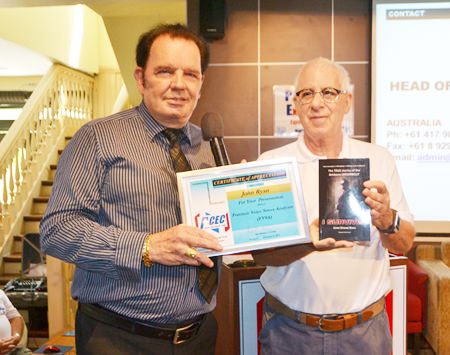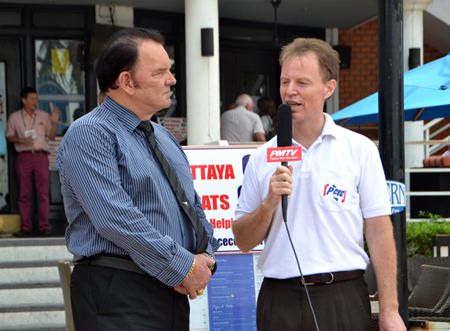Don’t tell a lie – if you do, the Forensic Voice Stress Analyzer (FVSA) will detect it. This was the message at the Sunday, February 8 meeting of the Pattaya City Expats Club from John Ryan, Director of Training for International Truth Verification Technologies Institute (ITVTI); based in Perth, Western Australia, it is the developer of the FVSA. At the Club’s December 10, 2010, meeting John first introduced the FVSA and was invited back to give an update. John also spoke to the club in December 2012 about his book, “I Survived.”
John is well known as a police and military trainer. He is an expert in the field of interviewing and interrogation along with deception detection, having trained in various techniques in a variety of locations with different instruments over a period of 40 plus years. He has authored several training manuals on the subject and has trained police and intelligence agents in Advanced Forensic Interviewing Techniques including the use of the FVSA.
 John Ryan provides his PCEC audience with a history of devices designed to detect deception; but were inadequate as they all had flaws.
John Ryan provides his PCEC audience with a history of devices designed to detect deception; but were inadequate as they all had flaws.
John said he knew by the time that he was 15 years old that he wanted to be a cop. But John couldn’t become a cop in Australia at that time because he was short-sighted and wore glasses. Instead, he trained in the martial arts, became a bodyguard, joined the military police and became interested in interrogation techniques.
Born in Brisbane, Australia, John mentioned that he became interested in a case where the 8-year-old son of a man who had just won the New South Wales lottery was kidnapped for ransom. John, following the news of this event, predicted that the boy was dead and that whoever killed him was already out of the state or the country. He was right on both counts. Ironically, 41 years after the kidnapping in New South Wales, John was hired to protect a family in Perth, including an 8-year-old boy, who had won a $31 million lottery and whose identity had been publicly exposed.
 PCEC Member “Hawaii” Bob Sutterfield assists John Ryan in a live demonstration of the FVSA by giving truthful and untruthful answers to John’s questions with the FVSA results graphically displayed on the computer.
PCEC Member “Hawaii” Bob Sutterfield assists John Ryan in a live demonstration of the FVSA by giving truthful and untruthful answers to John’s questions with the FVSA results graphically displayed on the computer.
John said that the polygraph test, commonly referred to as the lie detector test, was invented in 1930 by a California police officer. The only problem with it, he explained, is that it didn’t work! The polygraphs were produced by police and military personnel, with no involvement by academics, engineers or scientists in its development. In 1971, a polygraph expert realised that it didn’t work. He and two of his colleagues produced another instrument called the PSE – psychological stress evaluator. When the PSE was attached to a tape recorder, it became possible to slow down recorded speech by four times, play it through some filters, and print out the results on paper similar to the paper used for the polygraph. The idea was that voice speech patterns would reveal whether someone was being truthful or deceptive.
 MC Richard Silverberg presents John Ryan with the PCEC’s Certificate of Appreciation for his interesting talk about and demonstration of the FVSA.
MC Richard Silverberg presents John Ryan with the PCEC’s Certificate of Appreciation for his interesting talk about and demonstration of the FVSA.
The PSE was the forerunner to voice stress analysers. Between 1972 and 1994 several analogue and digitalized voice stress analysers arrived on the market, most of them based on the PSE. In 2006, after much research and development including the involvement of academics, engineers, and scientists, John and several colleagues launched the FVSA. John said that in 2007 they sold their first units to Singapore and Malaysia. Today, the FVSA is also being used in Australia, Brunei, South Africa, the U.K. and the U.S. It is also being used in Thailand – in Pattaya, in fact.
John’s company ITVTI is the sole manufacturer and supplier of the FVSA which is a software program that can be used on a personal computer. It is sold exclusively to government, intelligence and law enforcement agencies, security companies, the military, and certain corporate and sporting bodies. A border detection edition is also available.
As he had done when he first spoke to the PCEC in 2010, John conducted a live demonstration of the FVSA, with the participation of a member of the audience. John asked him to answer a few specific questions, first truthfully and then with an untruthful answer. He displayed the results on a computer screen. The difference in the recorded speech patterns between a truthful response and an untruthful one was quite obvious.
 Ren Lexander interviews John Ryan for Pattaya Mail TV after his presentation to the PCEC. Visit https://www.youtube.com/watch?v=w8G0EuZ-gKI&feature=youtu.be to view the interview.
Ren Lexander interviews John Ryan for Pattaya Mail TV after his presentation to the PCEC. Visit https://www.youtube.com/watch?v=w8G0EuZ-gKI&feature=youtu.be to view the interview.
John said that the FVSA is used primarily as an investigation tool. It has been used in a court setting in Malaysia and California, but both parties had to agree to its use. In answer to a question, John recounted the case of a waiter in Ohio accused of molesting a female employee. He took the polygraph test and passed. He took a different voice stress test and passed. One month later, he took the FVSA and failed. It took three hours to get a confession from him, John said. In answer to other questions from the audience, John answered that the software sells for $12,000 which includes five days of training with two instructors. He said that the FVSA doesn’t work if the subject is a true psychotic because psychotics have no basis of reality in their own minds.
After the presentation, MC Richard Silverberg brought everyone up to date on upcoming events and called on Roy Albiston to conduct the Open Forum, where questions are asked and answered about Expat living in Thailand, especially Pattaya.
For more information on the PCEC’s many activities, visit their website at www. pcecclub.org.




